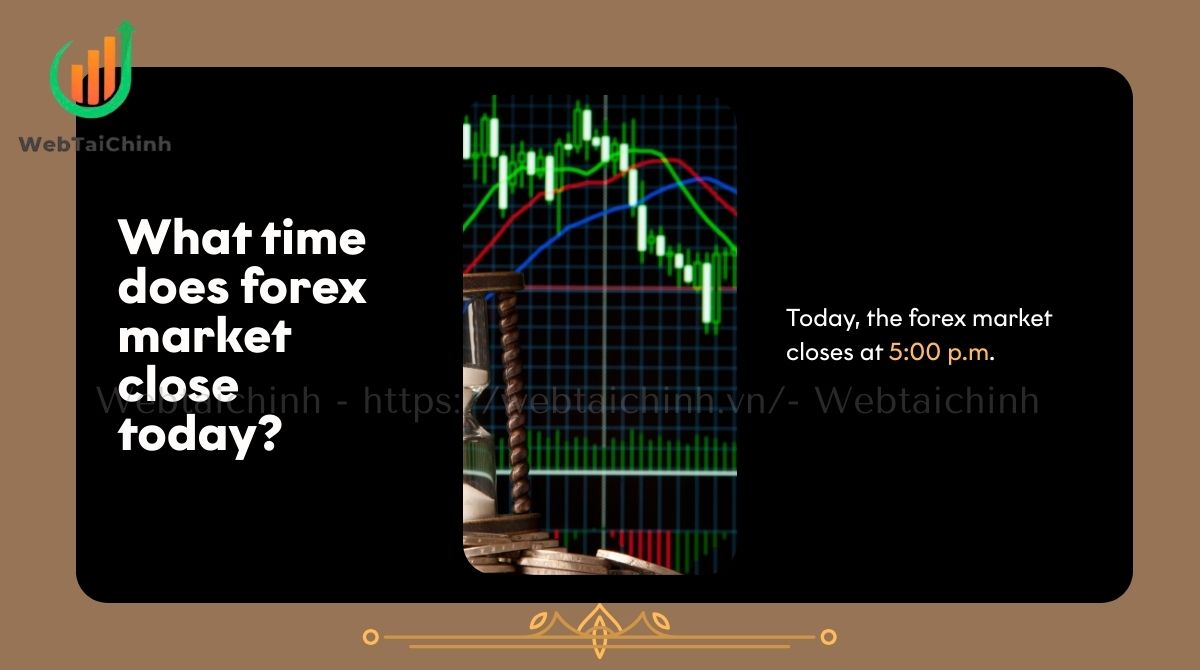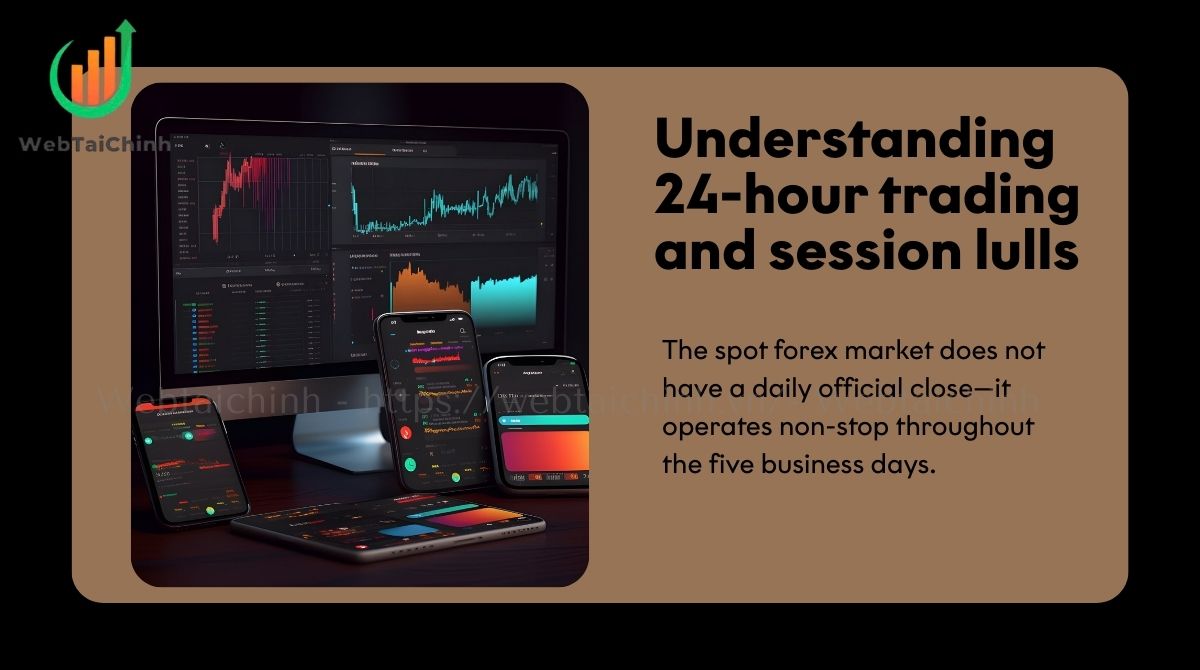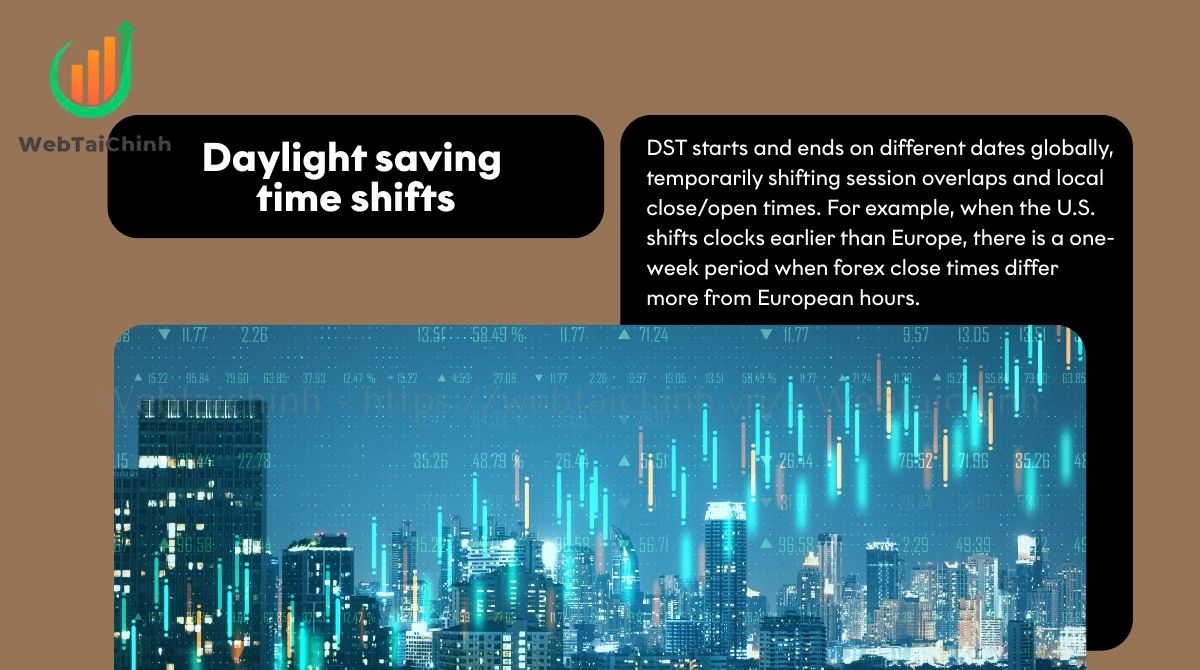Physical Address
304 North Cardinal St.
Dorchester Center, MA 02124
Physical Address
304 North Cardinal St.
Dorchester Center, MA 02124

If you’re a trader wondering what time does forex market close today, you’re not alone. Knowing the exact closing time is crucial for managing trades, avoiding unnecessary risks, and preparing for the weekend market gap. This guide will break down today’s forex market close in both Eastern Time (ET) and local equivalents, helping you stay aligned with global trading hours.
Key takeaways:
Today, the forex market closes at 5:00 p.m. Since it is Friday, this marks the end of the trading week, with the market resuming again on Sunday at 5:00 p.m. ET.

Keep in mind that the forex market operates 24 hours a day during weekdays, so outside these weekend breaks, trading is essentially continuous. However, liquidity can vary, especially near closing times, and broker-specific practices might influence trading availability during rollover periods or maintenance windows.
The spot forex market is unique because it operates continuously for five days a week—opening Sunday afternoon and closing Friday afternoon (in ET). This non-stop schedule supports global currency trading across time zones and trading hubs.
Forex closing times vary by location and depend on Daylight Saving Time (DST) shifts. Below is a table illustrating the Friday 5:00 p.m. ET close converted to several major zones:
| Time zone | Standard time (EST) | Daylight time (EDT) |
| Eastern Time (ET) | 5:00 p.m. | 5:00 p.m. |
| Pacific Time (PT) | 2:00 p.m. | 2:00 p.m. |
| Greenwich Mean Time (GMT) | 10:00 p.m. | 9:00 p.m. |
| Indian Standard Time (IST) | 3:30 a.m. (next day) | 2:30 a.m. (next day) |
| Japan Standard Time (JST) | 7:00 a.m. (next day) | 6:00 a.m. (next day) |
| Singapore Time (SGT) | 10:00 p.m. | 9:00 p.m. |
| Australian Eastern Standard Time (AEST) | 11:00 a.m. (next day) | 10:00 a.m. (next day) |
These conversions emphasize the importance of understanding your local time and DST status in relation to the New York close.
Understanding what time does forex market close today comes down to the global standard set by New York’s 5:00 p.m. cutoff. This moment is more than just a market pause—it defines the official end of the trading day, resets positions for swaps and rollovers, and directly impacts broker operations worldwide.
5:00 p.m. ET is recognized worldwide as the definitive close for spot forex markets. This time establishes the boundary between trading days, allowing for the calculation of swap rates (rollovers) and marking the transition of open positions to the next trading day. It’s the moment when the “day” officially ends in the OTC FX market.
Because of its importance, many retail broker platforms synchronize operations to this New York close, making it a pivotal time for forex traders globally.
Many traders asking what time does forex market close today are surprised to learn that there isn’t a true daily close. Instead, forex runs continuously from Monday to Friday, with only certain low-liquidity periods that feel like a “pause.” These session lulls can affect spreads, execution speed, and overall trading conditions.
The spot forex market does not have a daily official close—it operates non-stop throughout the five business days. However, liquidity fluctuates, creating ‘lulls’ during certain low-activity periods, notably after the New York session closes and before the Tokyo session opens.

Recognizing these periods helps traders anticipate risk and adjust strategies accordingly.
When exploring what time does forex market close today, it’s equally important to understand how global trading sessions shape market behavior. The Sydney, Tokyo, London, and New York sessions each bring unique levels of activity, with overlaps creating the highest liquidity and best trading opportunities.
The forex market is commonly divided into four primary trading sessions, each influenced by their key financial centers:
Liquidity and volatility peak during session overlaps, especially:
For traders asking what time does forex market close today, it’s essential to note that holidays and special events can temporarily change market dynamics. While forex itself stays open 24/5, liquidity often drops, spreads widen, and broker-specific adjustments may influence trading conditions during these periods.
Read more: Which forex news event have the largest moves? Top list
DST starts and ends on different dates globally, temporarily shifting session overlaps and local close/open times. For example, when the U.S. shifts clocks earlier than Europe, there is a one-week period when forex close times differ more from European hours.

Merchants and traders should consult updated calendars and broker communications to adapt to these time shifts effectively.
Many forex brokers implement brief pauses or maintenance windows around the 5:00 p.m. ET rollover to process swaps and reset daily limits. The duration and exact timing can vary, so traders should check their broker’s specific schedule.
Always review your trading instruments’ operational hours to avoid unexpected market closures.
| Time Zone | Friday 5:00 p.m. ET Close | Sunday 5:00 p.m. ET Open |
| Pacific Time (PT) | 2:00 p.m. Friday | 2:00 p.m. Sunday |
| Greenwich Mean Time (GMT) | 10:00 p.m. Friday | 10:00 p.m. Sunday |
| Indian Standard Time (IST) | 3:30 a.m. Saturday | 3:30 a.m. Monday |
| Japan Standard Time (JST) | 7:00 a.m. Saturday | 7:00 a.m. Monday |
| Australian Eastern Standard Time (AEST) | 11:00 a.m. Saturday | 11:00 a.m. Monday |
During DST periods, for example, New York may observe daylight saving while London hasn’t yet changed clocks, causing discrepancies in local close times for about a week. This makes checking updated timezone converters or broker notifications essential in planning your trading schedule.
Major economic announcements near the 5:00 p.m. ET close or open can amplify volatility and slippage risk. Risk-aware traders should consider timing their trades or using pending orders to manage exposure during these periods.
Read more:
No, spot forex operates 24 hours a day on weekdays without a daily close; it only pauses on weekends.
Forex reopens each Sunday at 5:00 p.m. ET, effectively starting the new trading week.
Generally, yes. Forex runs OTC 24/5, but liquidity can drop significantly on major bank holidays.
Yes, many crypto FX pairs are available 24/7, independent of traditional forex market hours.
DST shifts temporarily alter the equivalent local closing/opening times until all regions synchronize.
Understanding what time does forex market close today allows traders to plan smarter entries and exits, minimize risks during low-liquidity periods, and make the most of overlapping sessions. For more accurate forex insights, trading strategies, and market updates, visit webtaichinh and take your trading knowledge to the next level.
Web Tai Chinh is a portal that updates news and information related to finance quickly and accurately, helping users have an overview before investing, clearly understanding concepts and terms related to Finance. Explore more insights in our Forex category, start your FX trading journey today with the right partner for long-term success.
📞 Contact: 055 937 9204
✉️ Email: webtaichinhvnvn@gmail.com
📍 Address: 13 Ho Tung Mau, An Binh, Di An, Binh Duong